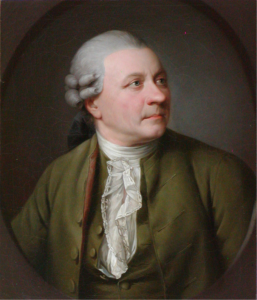Selma und Selmar
(Poet's title: Selma und Selmar)
Set by Schubert:
D 286
[September 14, 1815]
Weine du nicht, o die ich innig liebe,
Dass ein trauriger Tag von dir mich scheidet!
Wenn nun wieder Hesperus dir dort lächelt,
Komm ich Glücklicher wieder.
Aber in dunkler Nacht ersteigst du Felsen,
Schwebst in täuschender dunkler Nacht auf Wassern!
Teilt’ ich nur mit dir die Gefahr zu sterben,
Würd’ ich Glückliche weinen?
Do not cry, you who I love fervently,
Because a sad day is going to separate me from you!
When Hesperus over there next smiles on you
I shall return to you, happy!
But in the dark night you will be climbing up cliffs,
You will be bobbing on the waters during the deceptive, dark night!
If I could share the danger with you to the point of death
Would I cry, being happy?
All translations into English that appear on this website, unless otherwise stated, are by Malcolm Wren. You are free to use them on condition that you acknowledge Malcolm Wren as the translator and schubertsong.uk as the source. Unless otherwise stated, the comments and essays that appear after the texts and translations are by Malcolm Wren and are © Copyright.
☙
Themes and images in this text:
Climbing Farewell and leave taking Hesperus, the evening star (Venus) Lethe Mountains and cliffs Night and the moon On the water – rowing and sailing Tears and crying
According to Selmar he is going to be away for a ‘day’, but will be back by nightfall, yet according to Selma, he is going to be off climbing cliffs in the darkness of night. He is going to be tossed on the water during the deceptive, dark night (the point is repeated, as if to challenge his more hopeful version of the future). Happiness is different for the two speakers, too. For Selmar, happiness comes after he has done his duty and returned home to his beloved Selma; for her, happiness would be to go off and share the risk with him. For him, it is something he is confident of, but for her, it is merely hypothetical. She wishes she could go but knows that she cannot, so she can only speak of what ‘would’ make her happy.
There is therefore an imbalance in the relationship despite the careful parallelism of the stanzas, intended to show the unity of the loving couple. Selmar takes the initiative, he gives instructions (‘do not cry’) and makes promises (‘I shall come back’); Selma, however, responds rather than initiates (‘but’), she thinks about the future and imagines how things might be if the world were different. The text begins with an imperative ‘Weine du nicht’ (do not weep) but ends with the same verb in the conditional form, ‘Würd’ ich weinen?’ (would I cry?). This is not a sign of weakness, though, since the hypothetical question is her way of defending and justifying her real tears. We end with the impression that although Selmar is using the language of certainty it is Selma’s doubts and worries that are closer to reality.
☙
Original Spelling Selma und Selmar Weine du nicht, o die ich innig liebe, Daß ein trauriger Tag von dir mich scheidet! Wenn nun wieder Hesperus dir dort lächelt, Komm', ich Glücklicher, wieder! Aber in dunkler Nacht ersteigst du Felsen, Schwebst in täuschender dunkler Nacht auf Wassern! Theilt' ich nur mit dir die Gefahr zu sterben; Würd', ich Glückliche, weinen?
Confirmed by Peter Rastl with Klopstocks Oden. Erster Band. Leipzig bey Georg Joachim Göschen. 1798, page 244; and with Oden von Klopstock. WIEN, gedruckt bey Joh. Thomas Edlen von Trattnern, k.k. Hofdruckern und Buchhändlern. 1784, page 224.
To see an early edition of the text, go to page 244 [262 von 356] here: http://digital.onb.ac.at/OnbViewer/viewer.faces?doc=ABO_%2BZ223304809


